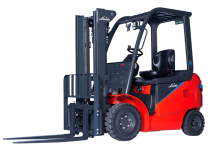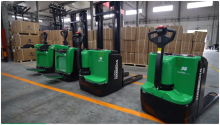In the UK, an estimated 200,000 people nationwide are employed in some capacity as lift truck drivers and by la...
In the UK, an estimated 200,000 people nationwide are employed in some capacity as lift truck drivers and by law they should all be properly trained to help reduce the number of accidents. But what are the risks associated with untrained drivers? And how are driver training providers such as Barloworld Handling helping companies avoid the heightened legal and financial impact associated with workplace accidents?
"Untrained drivers pose such a significant safety risk in the workplace that employers are legally obliged to train staff to use machinery safely as part of a company's Health and Safety policy and risk assessment" explains Gerry Simpson of Barloworld Handling, one of the UK's largest forklift driver training providers. Unfortunately not all companies comply with the regulations and this can lead to some very serious consequences. Between 2001/2002 and 2006/2007 the Health and Safety Executive recorded over 7000 accidents involving forklifts. Some 2651 of these incidents resulted in major injuries of which 51 were fatal.
In addition to the serious risk of injury to workers, companies also face a huge financial risk from untrained or unsupervised drivers particularly if an accident prompts an HSE inspection. PUWER (Provision and Use of Work Equipment Regulations) legislation states that work equipment can only be used by people who have received adequate information, instruction and training. Company executives that do not provide adequate training may be found negligent and can face heavy fines, legal fees and even custodial sentences.
According to Barloworld, insurance policies may prove invalid and premiums may rise in the event of accidents resulting from untrained drivers. Companies will also face additional expense in the form of vehicle repairs, damage to merchandise, staff absenteeism, sick pay, hiring of temporary staff and additional training. Where an accident causes vehicle downtime this can lead to lost business, compensation to customers and loss of company reputation.
"Many employers have been caught out by not sourcing good quality training for their drivers. To meet the legal requirements and avoid risk, training should be thorough and relate to specific vehicles and their intended application" adds Gerry Simpson. HSE guidelines state that employers should only use training providers accredited by one of 5 recognised governing bodies such as RTITB* and ITSSAR** through which Barloworld is accredited. Barloworld trains around 6,000 operators a year, offering a variety of courses at one of 6 nationwide purpose-built training centres or on-site at the employer's facilities.
Driver training should suit the experience and role of the operator. For example, Barloworld offers different courses depending on the level of experience, including instructor courses and refresher courses which help to identify bad habits and familiarise drivers with new equipment and handling procedures. On completion of a course, operators receive a certificate which gives a description of what they are qualified to do and is highly valuable for any new employer who must check the specifics of the training carefully.
In operation, continued supervision is essential to make sure drivers stick to best practice. Barloworld's Lift Truck Safety Awareness Course gives Managers and Supervisors an understanding of basic lift truck handling principles, risks and HSE safety guidelines so they can ensure short-cuts do not work themselves into daily routines.
Many forklift truck accidents could be avoided if the principles of basic training were adhered to and continued supervision was in place. Employers must take ownership in implementing safety by assessing risks and providing adequate training tuned to their specific operation. Without it, business executives are taking a big risk with employee's lives as well as the balance sheet.
















 粤公网安备 44010602003952号
粤公网安备 44010602003952号